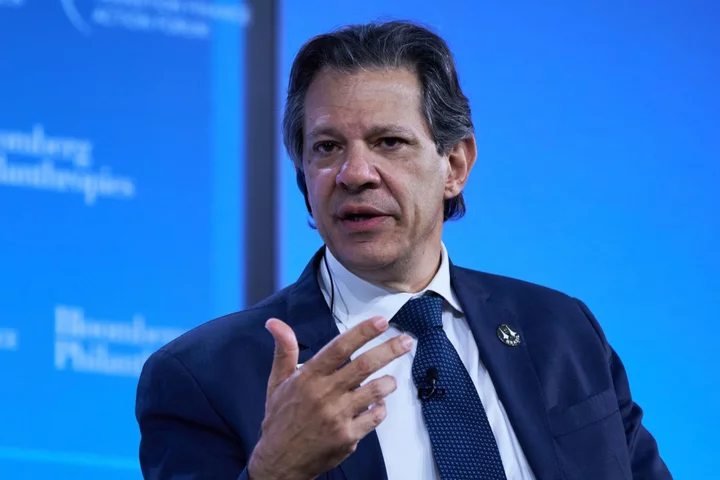Brazil is on track to balance its budget next year if congress does its part to help raise the 168 billion reais ($33 billion) in revenues necessary to hit that target, Finance Minister Fernando Haddad said in an interview.
Haddad has spent the last month pushing legislative leaders to approve a series of measures to raise revenue, after President Luiz Inacio Lula da Silva in August unveiled a 2024 budget proposal that seeks to boost spending by 129 billion reais while also delivering on Haddad’s promise to zero Brazil’s primary budget deficit next year.
The finance minister successfully steered his first major initiative — a fiscal framework plan to replace Brazil’s so-called spending cap rule — through congress, but has faced pushback from lawmakers over Lula’s efforts to raise taxes on the wealthy to balance his spending plans.
“The appeal we are making to congress is to reestablish a minimum of budgetary discipline so that we can return to talking about fiscal targets,” Haddad told Bloomberg News on Friday in Morocco, where he is attending the International Monetary Fund and World Bank’ annual meetings. “For the new fiscal framework to work well, we have to accelerate the process of recovering the state’s fiscal base.”
Read More: Lula Seeks to Tax the Rich to Help Balance Brazil’s Budget
Haddad’s policy approach has helped soothe investor fears about Lula’s spending plans since the leftist leader returned to the presidency in January promising to bolster social welfare programs. But he has faced mounting skepticism that he can follow through on his pledge to eliminate the deficit, especially as Brazil’s fiscal outlook has worsened this year.
The country’s primary deficit, which excludes interest payments, was 0.7% of gross domestic product over the past 12 months through August, according to central bank data. That compares with a 1.3% surplus at the end of 2022. The deficit is projected to reach 141.4 billion reais by the end of 2023.
But Haddad may now be on the cusp of a breakthrough with lawmakers. After weeks of negotiations and a re-organization of Lula’s cabinet meant to shore up congressional support, the lower house is tentatively scheduled to vote next week on legislation to tax offshore companies and exclusive funds, one of Haddad’s key revenue-generating proposals.
Haddad will still need to raise significantly more to meet his target but said he is confident congress will ultimately help him fulfill the goal.
Read More: Brazil’s Balanced Budget Dream Is Running Into Revenue Reality
“If we manage to approve the fiscal measures that we send to congress with the same success as we had in the first half of the year, we will be able to work within the expectations of the fiscal framework,” Haddad said. “It will work by reducing the deficit year after year.”
“If I’m not optimistic, I have to get another job,” he added. “I believe that congress has remained sensitive to the information that the government is providing.”
Interest Rates
Haddad also remains confident that Brazil can continue to control inflation even amid an increasingly volatile international scenario that has sparked some worries among analysts — and on his own economic team — that the central bank will soon need to slow the pace of its current easing cycle.
The central bank cut the benchmark interest rate by half a percentage point for the second consecutive time in September, lowering the Selic to 12.75%. Policymakers have said they plan to continue at that pace.
Read More: Soaring US Yields Seen as Biggest Threat to Brazil’s Rate Cuts
But they have also faced calls to remain cautious as rising US Treasury yields cause the real to drop against the dollar, helping renew inflation worries.
“The level at which interest rates are today in Brazil is still very restrictive according to the central bank’s own parameters,” Haddad said. “The projected inflation and the way the central bank calculates the neutral interest rate, we are well above this level.”
“Even with the projected cuts, the policy is still restrictive,” he continued. “So assuming that inflation in 2024 will be lower than this year is almost a certainty. And 2025 inflation is very close to the target.”
The central bank targets inflation at 3.25% this year and then 3% through 2026, with a tolerance range of plus or minus 1.5 percentage points.
(Recasts lead and adds additional context throughout.)

